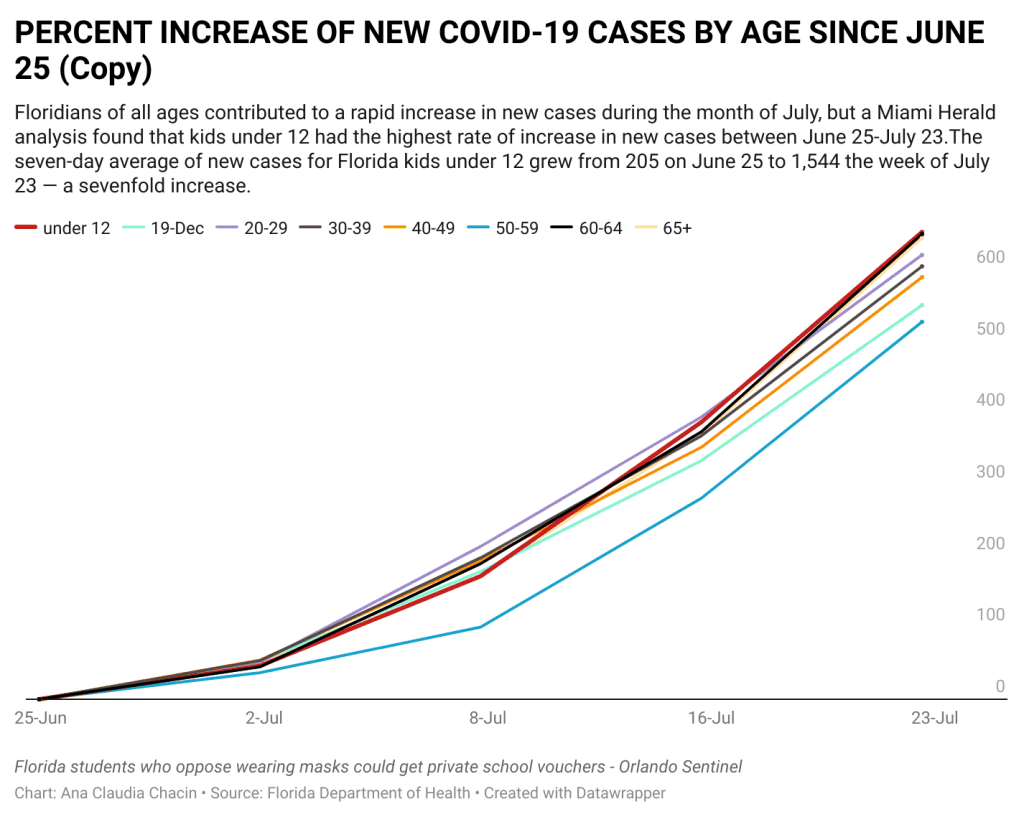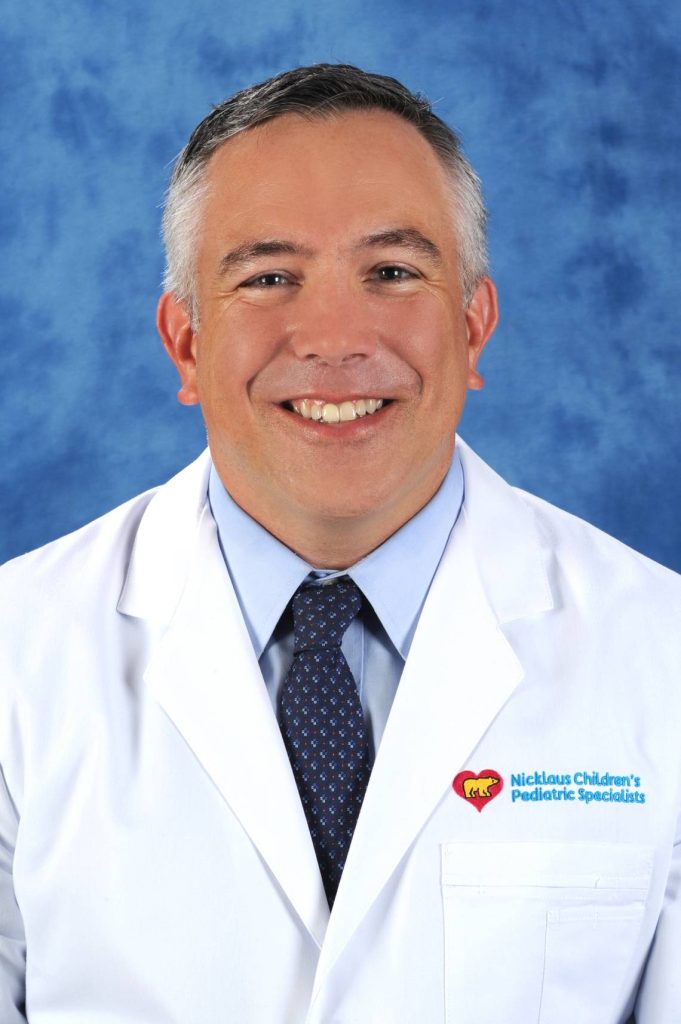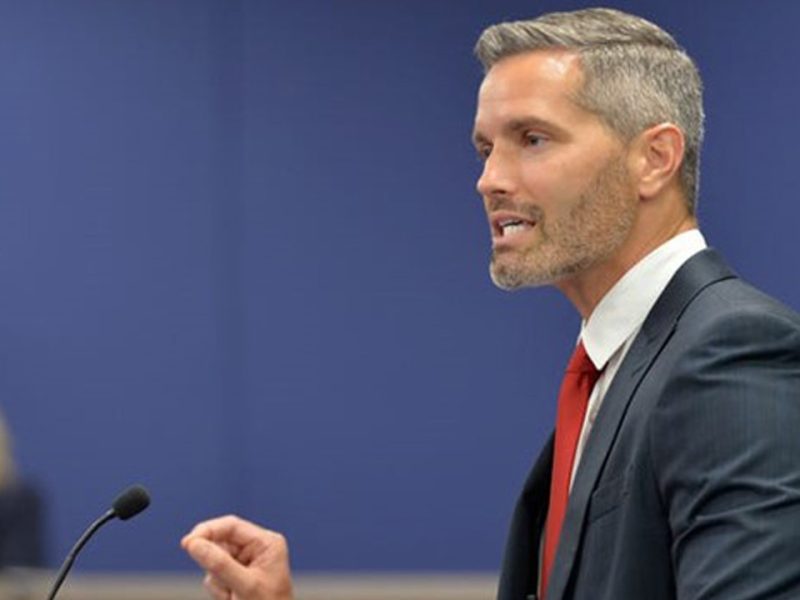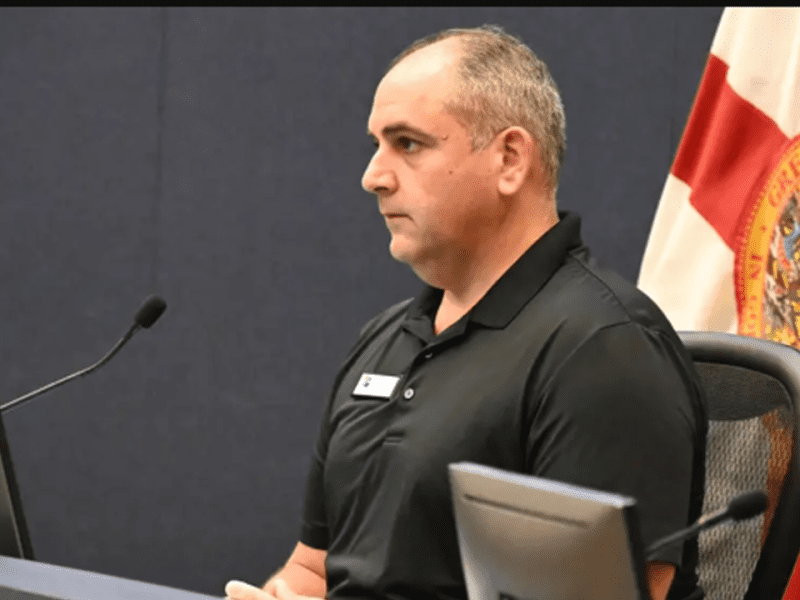
Florida children’s hospitals see pediatric COVID cases soar amid delta variant surge
Miami Herald | By Daniel Chang and Ana Claudia Chacin | August 5, 2021
More Florida children were hospitalized with COVID-19 on Tuesday than in any other state, reflecting a rapid rise in serious illness among an age group considered to be at the lowest risk of severe outcomes from the disease and many still not eligible for the vaccine.
A total of 46 pediatric patients were admitted to a Florida hospital with a confirmed infection while an additional 22 were hospitalized with a suspected case, according to the federal government’s hospital capacity data.
Only Texas reported a higher total number of pediatric patients in hospitals with confirmed COVID-19 on Tuesday — 142 children — compared to 135 in Florida.
Although cases have spiked across all age groups in Florida, a Miami Herald analysis of weekly case data revealed that the sharpest increase over the past month has occurred among kids under 12.

On June 29, the seven-day average of new cases for Florida kids under 12 was 205. By July 29, that number had increased more than sevenfold to 1,544 — slightly higher than the increase among 60- to 64-year-olds, who have been eligible for the vaccine since March 15.

‘A SIGNIFICANT UPTICK’
Physicians and public health experts attribute the rise in pediatric hospital admissions to the more contagious delta variant of the virus that causes COVID-19 — which produces a viral load that is roughly 1,000 times higher than the original coronavirus strain — and the low rate of vaccination among those younger than 20.
At South Florida children’s hospitals in recent weeks, emergency room doctors have seen more symptomatic children than they did during the surges in spring and summer of 2020, said Dr. Ronald Ford, chief medical officer for Memorial Healthcare System’s Joe DiMaggio Children’s Hospital in Hollywood.
“In our previous iteration of the pandemic, it was more they’re positive but they’re not sick or minimally sick,” Ford said of the pandemic’s changing impact on children. “This is different. … There’s a much higher percentage of pediatric patients becoming infected and symptomatic.”
The number of patients presenting at Memorial Health and Joe DiMaggio Children’s emergency rooms with COVID also has exploded, Ford said, from 23 in June to 240 in July, a nearly 1,000% increase.
“The rate of rise has been really more than what we in the children’s hospital have seen at any point in time in this pandemic,” Ford said. “That to me is concerning.”
At Nicklaus Children’s Hospital in Miami, emergency rooms have also been busy with a spike in pediatric patients over the past three to four weeks, said Dr. Marcos Mestre, chief medical officer for the hospital.
“There’s definitely a significant uptick,” Mestre said, noting that while Nicklaus Children’s admitted a total of 16 pediatric patients with COVID-19 in June, the number shot up to more than 60 in July.

Mestre said most of the patients admitted to Nicklaus Children’s in July were infected with the predominant strain of the virus, the highly transmissible delta variant, which made up more than 85% of samples collected by the CDC in the Southeastern United States during the two weeks that ended July 31.
With school resuming in two weeks and Florida’s governor banning masks in schools, millions of children across the state will be crowding into buses, classrooms, cafeterias and other indoor areas — raising the risk that the most transmissible strain of SARS-CoV-2 will find plenty of unvaccinated hosts to keep spreading the disease.
Mary Jo Trepka, an infectious disease epidemiologist and professor at Florida International University, said the spike in pediatric hospitalizations over the last week was preventable.
“It’s very unfortunate,” she said. “These kids didn’t even get to make the decisions that are impacting their health.”
Trepka said she is especially concerned about kids starting school again. She urged parents to get their eligible children 12 and older vaccinated. The sooner the better, she said, “because it takes five weeks to get your child fully vaccinated.”
For parents, Trepka advised they send their children back to school with effective face masks, such as an N95 respirator mask, to protect against the more contagious variant.
“Just a thin piece of cloth that falls off their nose is going to do nothing for that child,” she said.

Ford, the pediatric hospitalist with Joe DiMaggio Children’s, urged parents to be prepared for the possibility that their child may bring home the virus.
“Even children who come home with minimal symptoms they’re able to spread this very effectively,” he said.
Ford advises parents to find trusted sources of information on the pandemic and to take an active role in making their children feel comfortable with prevention measures, which have not changed.
“It’s nothing we haven’t talked about before — masking, social distancing, hand hygiene, making good choices and staying home when you’re sick,” he said.
With the resurgent pandemic rekindling memories of lockdowns and quarantines, Ford said, parents should also watch for behavioral and mental health changes in their children. Many students experienced anxiety and depression over the past school year as a result of remote learning and being isolated from their friends.
“We’re fully expecting to see another surge of children and adolescents with behavioral health complaints coming to our emergency department,” he said.

NEW CASES RISE AND HOSPITALIZATIONS FOLLOW
The rise in pediatric hospitalizations follows a similar spike in new cases among children in Florida. The state health department reported 10,785 new COVID-19 infections among children under 12 for the week ending July 29.
Among those who are 12 to 19 and eligible for the vaccine, the health department reported more than 11,000 new cases during the same time period.
Deaths related to the resurgent pandemic are more difficult to gauge because of lags in reporting time and the available data, said Jason Salemi, an epidemiologist with the University of South Florida in Tampa.
There have been seven deaths reported among children 16 and under since the beginning of the pandemic in March 2020, but Florida stopped reporting COVID-19 deaths by age group to the Centers for Disease Control and Prevention in July.
Mestre noted that of the 15 children hospitalized at Nicklaus Children’s on Wednesday with COVID-19, about half were under 12, with the youngest being 2 months old. Five of the children were in intensive care, he said.
Because children under 12 are not eligible for the vaccine, physicians note that they are now among the more vulnerable segments of the population. Elderly Floridians, who are still at the highest risk of developing severe illness, were prioritized for vaccination and now make up a minority of patients at South Florida hospitals, with some reporting that about nine of 10 patients with COVID-19 are not vaccinated.
But Mestre of Nicklaus Children’s emphasized that data will not tell the entire story of how COVID-19 and the delta variant will impact children. Some may experience long-term symptoms from the disease, he said, and others may be affected in ways few anticipated.
“To me,” he said, “it’s a factor of not just looking at mortality and hospitalization. It’s about looking at how this affects the life of the child outside of the hospital.”
Children under 12 make up one of the largest segments of Florida’s population, with 2.85 million statewide. And the number of new cases among Floridians under 12 during the week ending July 29 — 10,785 cases — was more than the total number of cases for all age groups just six weeks earlier, he said.
Still, Salemi urged Floridians to keep the risk for children in perspective.
“We have really bad trends that are happening in the pediatric population but I don’t want to scare people into thinking their child is going to experience severe illness,” he said. “The overwhelming majority of infections are going to be mild or asymptomatic in children.”
At Joe DiMaggio Children’s, Ford said he has not admitted many kids to the intensive care unit. But he said doctors and nurses are preparing for the possibility that Florida hospitals may begin to see much sicker children.
He noted that in Arkansas, a children’s hospital reported a surge of much sicker pediatric patients needing ventilators and intensive care.
“We haven’t seen that pan out in Florida,” he said. “But I do worry very much that that may be in our not too distant future because of the way this is spreading.”





